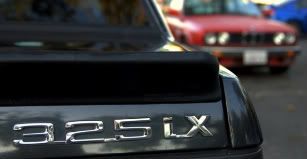Surveillance vid is a bit grainy and is in B&W, but you can see the plane land in the water near the top of the screen:
Video of Flight 1549 landing in the water...
Collapse
X
-
Video of Flight 1549 landing in the water...
sigpic
1988 5 spd.Cabrio/Lachs Silber/Black Leather/123k/Dealer Serviced & Maintained by both PO's
Clarion DXZ785USB HU, BBS Wheels, Leather e-brake handle & e-brake boot, Mtech 1 Wheel, Maplight Mirror, Performance chip, Rear Headrests.
Previous E30: 1986 5 spd. 325es/Delphin Gray/Black Leather/191k

Tags: None -
The pilot deserves a damn medal. He lives in my town; instead we're giving him a parade. :)Comment
-
That guy lives a town over from me.
SC*AR
Originally posted by JamesE30And with a car looking like yours I imagine the balance shall tip in the favor of insult, like a big fat fucking retarded fucking black girl on a see-saw, opposite... a dwarf.Comment
-
-
its cool how he and the crew were given like totally front seats at the inauguration.AW 89' 325i Vert - SOLDComment
-
Comment
-
From a friend of mine, who's a retired pilot (he sent this to me)
I am sure by now that you have heard of the USAIR 320 crash in NYC, and have
been filled with the "experts" opinions' on what happened. While not
considered an expert on Airbus aircraft, (as I have just 7,000+ hours flying
time on the 321/320/319, Check Airman/Instructor credentials, 12 years MAJOR
airline experience, investigated several accidents/incidents and, oh yes, I
landed on aircraft carriers at night , plus I am not paid well) I shall
attempt to provide a glimpse into what most PROBABLY happened.
Keep in mind that from the emergency to the ditching, the accident took
place within a time span of approximately 3 minutes.***
Flight took off LGA RWY 4, Northeast bound, Rykers Island on the left. If
memory serves me correctly, LGA departure traffic get assigned 2-3,000 feet
initially with turns North, then West, etc. sequenced with other dep/arr
aircraft (JFK,EWR, LGA, et al). At 1500', the crew would have reduced power
from Takeoff (TOGA/FLEX) to Climb, and retracted the flaps/slats. This might
have been done at 3000' depending upon USAIR procedures regarding noise
abatement. At this point, I'll assume aircraft is clean at 1500'. From the
1500' point the aircraft is climbing/accelerating to 250 kts, all things
being equal.
At some point, the boys see a gaggle of birds and wham...these lucky devils
get to have some real fun.
Keep in mind that from this point on, only 3 minutes will elapse.
Reports are that an explosion/fire on the left engine occurred. Thus, if
correct, an ENG 1 fire warning/failure (loss of thrust) ding ding ding. Crew
would be performing applicable procedures according to the ECAM ( TV screen
in cockpit, tells us what to do). From what happened, though, it appears as
if the other engine was affected as well. Not sure yet if it had failed, or
was operating at insufficient thrust to keep the plane airborne. As we all
know, you can fly just fine on one engine. Because the aircraft didn't stay
airborne much longer, and aircraft was controllable (some hydraulic power) I
assume that both engines are not working. Now, you have a DUAL engine
failure at 3000' with at least one engine is/was on fire. (Later pictures
show no smoke trail)
Naturally, the crew declares an emergency and tells ATC they want to land
immediately. ATC gives them a vector back to LGA, but no more transmissions
are heard. This is because the shit is hitting the fan in the cockpit.
Most likely, the Captain was flying while the FO was applying the emergency
procedures. When you have a dual engine failure on the Airbus, you lose two
of the three hydraulic systems. These two systems, green and yellow, control
most of the aircraft systems. The third system, blue, is powered by an
electrically or air turbine (RAT) powered pump. This blue pump/system
provides enough hydraulic power for basic aircraft control, ailerons, some
spoilers and slats but no flaps. Also, the engines power electrical
generators; lose the engines, lose most electrical power. When this happens,
the RAT, Ram Air Turbine, automatically deploys from the bottom of the
aircraft and provides essential electrical and hydraulic (blue pump) power.
Unless, of course, the APU is running.
The APU, Auxiliary Power Unit, is the small jet engine in the tail of the
Airbus which provides enough electrical and pneumatic power for most of the
electrical systems. The blue pump is electrical. Also, the yellow pump can
be powered electrically by pushing a button. This would in turn allow the
green system pump to be powered by a PTU, power transfer unit. This PTU can
be powered by either green or yellow system to allow both systems to work
normally thus allowing 100% hydraulic power. Everything would work..gear,
flaps, slats, etc.
Keep in mind, only 3 minutes were available to the crew.
What is not known yet is if the APU was running prior to the engine(s)
fire/failure(s). This depends upon company policy and Captain's discretion.
If it was running, then the electricals would be powered by the APU
generator, and the crew would have been directed by the emergency procedures
to turn on the yellow hydraulic pump electrical switch thus allowing for
hydraulic power. If the APU was not running, then most electricals would not
work, thus the RAT would deploy. And, the procedures would have the crew
start the APU. HOWEVER, you have to wait 45 seconds AFTER the dual engine
failure to start the APU. Why, you ask? Because the RAT hasn't done its
thing yet and the aircraft is powered by internal batteries only. Should the
RAT fail, you would have battery power only,( a real shitty situation on an
Airbus). Thus, if you try to start the APU and it doesn't start, no RAT, no
battery juice,.....welll now you have bigger headlines and a bunch of
lawyers getting into the mix. Oh yeah, it takes 1 minute for the APU to
start AFTER you press the button.
Keep in mind that the crew had 3 minutes.
SOOOOO, let's see where we are...
From the pictures it looks as though the gear was up, slats and some flaps
extended. No RAT was visible.
From the start of the emergency, the Captain was looking for a place to
land. The FO was extremely busy going through the checklists. Realizing not
much time was left, they may have skipped the engine/hydraulic, etc.
procedures and went to the emergency landing/ditching procedures. They had
the APU running thus hydraulic power available. Captain figured out early
enough that they had no chance at a runway and decided to ditch flaps
extended.
Thank God it was daylight, clear and not at night in the goo.
I have serious concerns that the outcome would have been catastrophically
different had the crew been 100 hour wonders, marginal training/experience,
and limited CRM skills. Read into this as you desire.
Keep in mind that the crew had just 3 minutes to do what they did.
They are not paid enough.
Comment
-
-
Incredible landing, very heroic pilotThe Keystone Killers
Originally posted by CabrioletWith 73k+ post, you'd think he'd have learned a little about life.Comment
-
This is because the shit is hitting the fan in the cockpit. LOL!
they arnt' paid enough? I know that there school is like 100k
but I will take there word for it, it sucks they dont get paid enough.
just another awesome veteran at work..
I guess the 100 hour wonders are the people that go to that expensive schoolComment
-
The pilot was a fellow alumnus of mine at grand old Purdue University, aeronautical engineer with specialty in gliding dynamics.
Boiler Up!!!Comment
-
Comment
-
apparenly they are getting paid too much because every airline goes into bankruptcy every other year.Comment










Comment